
You know the picture...
“Southern Italy, eh?” He gave me the raised eyebrow of caution. “Watch out for the men.”
This was Alex, his voice lifting above the roar of hair dryers and hip music at the salon, two days before I left on my trip.
A lady friend of his, he continued, had recently spent several weeks in the Mediterranean land of machismo. “Apparently, they all use the same line: ‘I have a girlfriend. But tonight, for you, no girlfriend.’ She said it got really old.”
I laughed. To be honest, it hadn’t crossed my mind yet. Dealing with the men of a country as a solo female traveler is usually one of the first things people ask me about when they hear I travel alone—right after the “is it safe” question. But the truth is, I’ve been doing this sola thing for awhile now, and whether or not the men somewhere will hound me to death doesn’t really factor into my travel considerations. Plus, I’ve done the majority of my traveling in Latin America, where sidewalks can at times feel like catwalks of degradation. As long as the men aren’t physically attacking me, I pretty much feel like I can handle it.
But Alex’s comment did give me pause. When it comes to safety (and drinking tap water), I throw caution to the wind in Europe. It’s the civilized, more highly evolved land of social safety nets and low crime. Hell, the vast majority of Europe is safer than my hometown. My hairdresser’s comment reminded me that, oh yeah, right, I’d be venturing off sola in a scant 48 hours and that maybe I’d ought to mentally prepare.
You stand out as a female solo traveler, and in a way, get to experience a culture more deeply, if no other reason than the fact that its men are talking to you more. My last trip took me to Southern Italy, Montenegro and the capital of Albania (and Croatia, but I only stayed for a day, so I’m not counting it). The men in each these countries treated me totally differently—and, I think, reveal a little something about the culture.
Italy
Oh, Italian men. They have quite the reputation. American women swoon for their accents, their sense of style, their motorinos and chest hair. And they’re known for hitting on pretty much anything that moves, serenading you with sweet odes of professed passion.
I don’t get it. And Italian men, apparently, don’t get me.
During my venture Rome-and-southwards, I was largely ignored by Italian men. Which suited me just fine. Again, having traveled heftily through Latin America and once through Morocco, I’m stoked on anything that isn’t street harassment. I’ll take being ignored over obscene insults any day.
But it did cause me wonder… Who the hell are all these American women who are getting hit on Italian men all the time? I’m a cute enough girl, but do you want to know why I wasn’t getting any attention from the dudes? Because they’re surrounded by Italian women—who are impossibly gorgeous and stylish, with their cascade of curly hair and their moody black eyeliner. I wouldn’t hit on me either.
Traveling through Southern Italy was like an adventure in mutual disinterest—as though every guy I passed on the street exchanged a brief little dialog with me: “Thanks but no thanks.” Italy is a pretty culturally conservative place, and I’m a pretty not culturally conservation person, in appearance or attitude. So it makes sense to me that the Italian men and I didn’t vibe. In person, that is.
While I was in Naples my Couchsurfing inbox got flooded with messages from shirtless dudes in sunglasses asking me if I needed a place to stay. (“Um, no.”) But this was the extent of the Italian sleaze I experienced—an indirect, easily ignored, half-assed attempt.
Maybe that was the secret to the purported flirtations of Italian men: that it’s largely impersonal, having less to do with you and whether or not there’s any real potential for something to happen, and more to do with, I dunno, not having anything else better to do? Hitting on someone just for the sake of hitting on someone?…
Montenegro
If ever a girl was thinking of a place to take advantage of men, Montenegro would be the place to do it. I had more offers for rides, tour guides, free drinks, places to stay, etc than anywhere else I’ve been.
But the curious thing was a) all the attention was from middle-aged men, no guys my own age, and b) they somehow managed to stay just on the right side of appropriate and respectful. I never felt violated or threatened by any of the Montenegrin men; it all just came across as really, really nice.
I was of course only getting the attention because I’m a pretty young(ish) American girl traveling alone. Montenegro is really trying to woo Western tourists, and I think I was something of an anomaly; there weren’t many Americans, weren’t many backpackers, weren’t many women alone. I think I was on the one hand intriguing for this reason; I think Montenegrins in general also really want tourists to feel welcome, want to take care of them. I must have sparked all the paternal instincts of the middle-aged men there. But somehow not in a demeaning way. Most curious.
Albania
At a certain point one night, it got ridiculous. I had to put on my sweater and get the hell off the dance floor.
It was like moths to a lightbulb. I have never received more male attention from males I actually wanted attention from than in Tirana. It was dangerous.
Albanians my age, it seems, really want to be Western. They’ve lived most of their lives in post-Communist Albania, but still relatively isolated from the rest of Europe. They’re ready, it seems, to be a part of the rest of the world.
For most kids, this striving seems to take the form of mainstream culture, the Top-40 kind. Stylistically, Tirana is filled with tons of extremely beautiful nouveau riche girls, who could, at first glance, blend in on Parisian sidewalks. You look a little closer and you realize that they don’t quite have it right yet; they wear a little too much make-up, their clothes not quite expensive enough.
But the point is, they’re trying really really hard. They have the posture, the poise, the carefully cultivated look of class in the arch of their fingers as they lean back and drag their cigarettes. They also don’t seem like a whole lot of fun—a little snobby, to be honest.
So I stood out, and not just for being foreign. There weren’t any other girls in Tirana like me, in sneakers and a band shirt, with short hair and tattoos. I’m a dime-a-dozen in the Bay Area, but in Tirana, I was the only act in town. And every single rock n roll dude, it seemed, was eying me. Or talking to me. Or offering me drinks or asking me out or wanting to dance with me.
Big-fish-in-a-little-pond syndrome. I’d never experienced it. After the initial rush of validation, though, it felt funny. It didn’t seem real and, in a way, it wasn’t.
It was like Genti’s indie rock band. An Albanian turned Brighton boy, Genti was just another dude in a band in England. But in Albania, he was becoming a big deal, selling a ton of albums and appearing on Albanian TV. It would have been easy, he told me, to really make it there. “But, I dunno,” he yelled over the barroom clatter, “do I really want to be the guy who was ‘really big in Albania’?”
I paused, and asked myself the same question. I was pretty damn sure that if all these rocker dudes were suddenly delivered into the Bay Area, they wouldn’t be tripping off me so much. I wanted to tell them, to put my hand gently on their shoulders and let them know, “Honey, there’s a big world out there, and it’s filled with a fuckton of cuter girls with more tattoos than me.”
But they’d have had to take my word for it. Cause it’s so damn hard for an Albanian to get a tourist visa, or to afford to travel anywhere where rock n roll girls live, places steeped in privilege.
So I did all I could do, which was to shake my head and laugh.

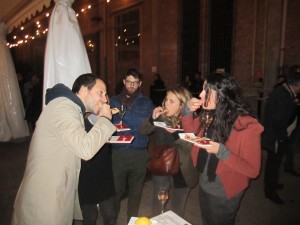

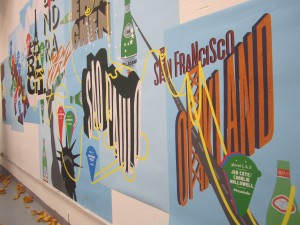


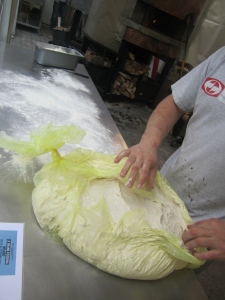









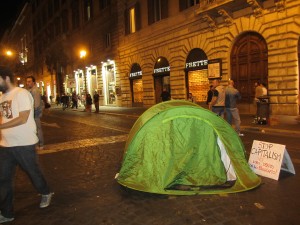

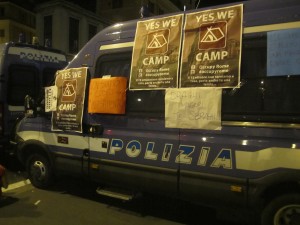






























































Recent Comments